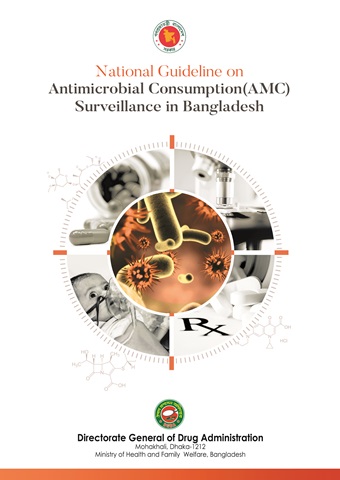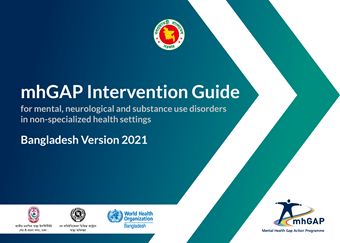
Publications and information resources
Publications
All →
Bangladesh: Factsheet 2024Expanded programme on Immunization (EPI)

Bangladesh: Factsheet 2023Expanded Programme on Immunization (EPI)

WHO Bangladesh Country Cooperation Strategy: 2020–2025
In the recent decades Bangladesh has made remarkable socioeconomic progress, including poverty reduction, improvement in women’s education, increasing...


Bangladesh: Factsheet 2021Expanded Programme on Immunization (Epi)

Bangladesh: gender and health
Gender is a major determinant of health for women and men in Bangladesh.Gender norms, roles, and relations interact with biological factors, in turn influencing...

In 2019, drowning was responsible for 70 034 deaths in the South-East Asia Region. This is the second highest number of deaths from across all regions...

Invisible: The Rohingyas, the crisis, the people and their health
A mass movement of the Rohingya people started on 25th August 2017 from the Rakhine state of Myanmar to Cox’s Bazar district of Bangladesh. This...
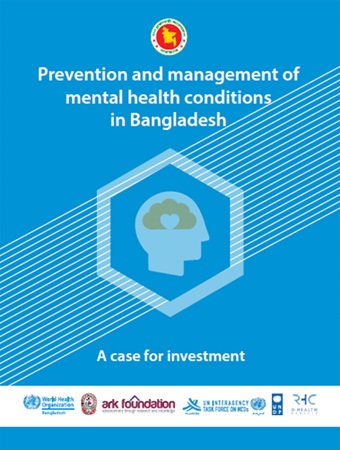
Mental, neurological, and substance use conditions pose a significant challenge in Bangladesh, and the prevalence of depression, anxiety, psychosis, bipolar...
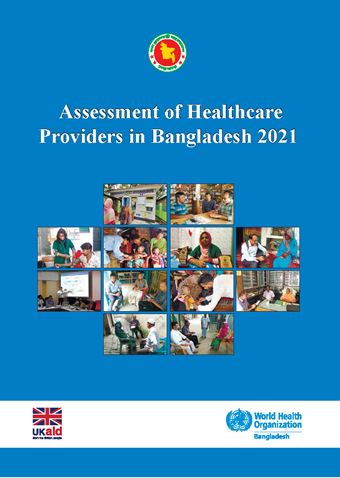
The Government of Bangladesh (GOB) is committed to ensuring equitable access to healthcare for all its citizens, regardless of demographic or geographic...
Documents
All →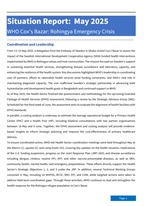
Coordination and LeadershipFrom 13–15 May 2025, a delegation from the Embassy of Sweden in Dhaka visited Cox’s Bazar to assess the impact of...
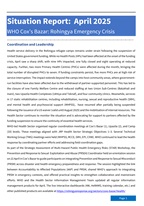
Coordination and LeadershipHealth service delivery in the Rohingya refugee camps remains under strain following the suspension of United States government...
/countries/bangladesh/ewars-bulletin-cover.tmb-144v.jpg?sfvrsn=70c4429a_1)
Weekly Epidemiological Bulletin - #Week 15, 2025
Early Warning, Alert and Response System (EWARS)Epidemiological HighlightsEWARS, Situation report, Health Sector Bulletin
/countries/bangladesh/ewars-bulletin-cover.tmb-144v.jpg?sfvrsn=70c4429a_1)
Weekly Epidemiological Bulletin - #Week 14, 2025
Early Warning, Alert and Response System (EWARS)Epidemiological HighlightsEWARS, Situation report, Health Sector Bulletin
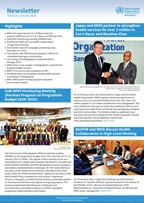
Newsletter Issue 24
Highlights:WHO and Japan launch $3.2 million project to support health services in Cox’s Bazar and Bhasan Char.GoB-WHO monitoring meeting (GWMM)...
STEPwise approach to NCD risk factor surveillance (STEPS)
STEPS is a household-based survey to obtain core data on the established risk factors that determine the major burden of NCDs. In 2018, STEPS was conducted by National Institute of Preventive and Social Medicine with technical assistance of WHO and financial assistance of NCDC, DGHS, MoHFW, Government of Bangladesh. The STEPS 2018 was a cross–sectional survey is carried out from September 2017 to June 2018 among adult population aged 18-69 years of men and women residing in the households of all the divisions of Bangladesh. Sampling was done by multistage, geographically stratified probability based sampling. All the 3 steps of STEPS are completed for the 1st time in this country by this countrywide population survey.
Please note that this version of the report is the revised and updated version and replaces all other versions in WHO website.
Global Adult Tobacco Survey Bangladesh Report 2017
8 October 2020
The Revenue and Employment Outcome of Biri Taxation in Bangladesh
10 December 2019
Executive-summary-the-revenue-and-employment-outcocme-of-biri-taxation-in-Bangladesh
10 December 2019
Performance of Public Sector Health Facilities In Bangladesh 2017: An In-Depth Analysis Report
30 May 2019
Health Minister’s National Award 2018: Technical brief
9 April 2019
The Cost of the Bangladesh Essential Health Service Package
9 September 2019
December 2018
Mapping of Health Professional Education Institutions in Bangladesh 2019
20 October 2018
Health Minister’s National Award 2017: Technical brief
23 February 2018





_page_001.tmb-340v.png?Culture=en&sfvrsn=b7a3dee_1)
